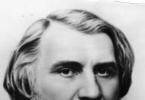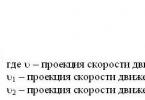Ancient Rus', as a rule, featured heroes fighting evil for the Russian land. They reflected the reality of the 11th-16th centuries. An epic is a unique genre that seems to reflect historical events, but with figurative exaggerations. The heroes in them have superpowers or other abilities (the ability to act, sing); and the enemies are absolutely fantastic: the Serpent Gorynych, the Nightingale the Robber, the King of the Sea. Since the epic is a song genre, it has a rhythm, a special syllable. Reading it, it’s as if you’re stepping back into the historical past and seeing a film, because it’s rich in figurative expressions.
Epic "Sadko"
The epic “Sadko” is a little different from other stories, a summary of which, by the way, you will read not much longer than the song itself.
If you are not lazy, you will get much more pleasure and benefit from reading the source than from someone else’s retelling. Although if you have problems understanding ancient Slavic words, then, of course, a summary of “Sadko” will help you better understand the essence of the mythical and slightly fantastic story. We recommend that after reading the presentation, turn to the original source and experience the beauty of the play on words.
What is the story about?
The epic "Sadko" is beautiful, unusual and different from other legends. Its summary may not make the right impression. There are no heroic heroes in it. There are no battles with obvious enemies. But it contains an idea about how important it is to have talent, the protection of the Higher Powers for personal qualities. The epic also talks about the fight against human vices, in particular, boasting. But all this can be found out indirectly by drawing your own conclusions, and not necessarily the same, perhaps completely different. Reading the summary of “Sadko”, you only learn the sequence of events.
Retelling
Once upon a time Sadko was a guslar. He was young, handsome and talented, but “goal like a falcon.” Gusli - all his property was. But Sadko loved to sing and play so much that even when no one wanted to listen to him, he came to the shore of Lake Ilmen and devoted himself to his favorite work alone. At least that's what he thought. After all, everything around was quiet. All nature listened to the wonderful singing.

I heard it one day and rose from the depths to reward the guslar for his marvelous playing. He ordered Sadko to make a bet with the merchants, mortgaging his head, that a wonderful fish, golden feather, lived in Lake Ilmen. And in return he ordered to ask them to pledge their goods and trading shops (business in our opinion). The three richest merchants agreed to a deal - they wanted to destroy Sadko out of envy. But the singer won the argument. The sea king kept his word and caught Sadko's goldfish in a net. On the advice of the Lord, he did not argue anymore and soon became rich thanks to the good he had acquired. But several years passed, he got married and became a merchant, the richest of whom was not in the city. He gave a noble feast, as was customary then. Many people gave speeches there: the stupid ones boasted about their young wife, the smart ones revered their parents. Sadko could not resist and began to boast about his wealth and bet that he could buy out all of Novgorod. But when he began to buy all the goods, gold and silver quickly began to run out. Sadko decided to sail to other cities to sell his goods. During the trip, a strong storm arose on the lake. And he would have sunk the ships, but Sadko understood in time: the Tsar demands tribute from the sea.

He ordered to pour a barrel of silver into the water, then gold, but the waves did not subside. Sadko understood: the king needs a human sacrifice. There was (this is an interesting point; it’s impossible to fit everything into a brief summary of “Sadko”). Sadko was chosen, even though he tried to be cunning. They lowered him into the water on a board, where he fell asleep, and woke up at the bottom of the sea in front of the chambers of the Lord, who was glad to have a guest. Sadko played for the king until he broke the strings (not without the intervention of other forces, which we also cannot fit into the summary of “Sadko”). Then the king invited the singer to choose a wife - one of his daughters, which meant remaining forever in the underwater kingdom. The hero (also not without the help of the Saint) chooses a living girl, thereby freeing the captive and himself.
The events in the epic unfold in the city of Novgorod. It splits into two parts (Sadko receives wealth and Sadko from the Sea King). Main character - guslar Sadko. At the beginning of the epic, the Novgorod boyars neglected him and stopped inviting him to feasts. Offended, Sadko goes to Lake Ilmen, sits on the “white-flammable stone” and begins to play “Yarovchaty Guselki”. The Sea King liked his game:
Just then the water in the lake began to stir, the king of the sea appeared, came out of Ilmen from the lake, and himself said these words: “Oh, you, Sadke of Novgorod! a gentle game." 1
The Sea King decided to help Sadko and give him untold wealth. He told him to make a bet with the Novgorod merchants that he would catch a fish in the lake - a golden feather. The king will send this fish to Sadko in the net.
Guslyar did just that and won three shops of red goods in a dispute with merchants, became rich, erected magnificent palaces, decorating them with marvelous paintings:
Sadke arranged everything in heavenly fashion: There is sun in the sky and there is sun in the chambers, There is a month in the sky and there is a month in the chambers, There are stars in the sky and there are stars in the chambers. 2
Sadko “invited noble guests to his honorable feast,” who at the feast ate, got drunk and all boasted with boasts." Sadko boasted of buying up all the goods in Novgorod, argued with him about the wealth. But the bet lost: no matter how much he bought goods in Novgorod shops, in the morning more and more new ones brought from all over Rus' appeared in them. And Sadko realized that he was not the rich merchant of Novgorod - his glorious Novgorod was richer. And if at the beginning of the epic the popular consciousness was on the side of the poor guslar, then Sadko the merchant, who imagined , that he is richer and stronger than the entire trading city, deprived of the sympathy of the people. The epic forces him to recognize the victory of Novgorod. It clearly expresses the idea of \u200b\u200bthe trading power of the great city of northern Rus'.
In the second part of the epic, Sadko, a rich merchant, equips ships and sets off with his comrades to trade overseas:
Strong weather met on the blue sea, The blackened ships stagnated on the blue sea: And the wave hits, tears the sails, Breaks the blackened ships; But the ships do not move from their place on the blue sea. 3
This is how landscape is introduced into the epic. The ships are at sea - the Sea King does not let Sadko in and demands a ransom from him. First, the shipbuilders try to pay off with a barrel of pure silver, red gold, but the wave hits everything, tears the sails, and “the ships still do not move from their place on the blue sea.” Sadko guesses that the Tsar of the Sea demands “a living head in the blue sea.” They cast lots three times as to who should go to the Sea King. And no matter how hard Sadko tried, the lot fell on him. Taking only the harp, Sadko rushes into the depths of the sea.
The image of the underwater kingdom in the epic is real, the landscape is realistic:
In the blue sea at the very bottom. Through the water I saw the baking red sun, the evening dawn, the morning dawn. I saw Sadko: in the blue sea there was a white stone chamber... 4
What we see here is not fantasy, but rather a certain amount of convention. The King of the Sea himself is also depicted. The epic gives only one detail of his portrait: “the king’s head is like a heap of hay.” The singers use the technique of hyperbolization: the king’s head is compared to a heap of hay, which indicates its significant size and introduces an element of comedy.
How Sadko began to play guselki yarovchaty, How the king of the sea began to dance in the blue sea, How the king of the sea began to dance. Sadke played for a day, others played too, and Sadke and others played, And still the king danced in the blue sea. 5
Grateful for the fun, the Sea King began to persuade Sadko to marry one of his thirty daughters. Meanwhile, in the blue sea, the waters shake, ships break, and righteous people drown.
In reality, an Orthodox person, in search of deliverance from misfortunes, always turns to Christian saints, which is reflected in the epic: “the people began to pray to Mikola of Mozhaisk.” It is no coincidence that the image of the Christian intercessor Mykola, the patron saint of all seafarers and sailors, is introduced into the epic. This reveals the general Christian idea of Russian folklore:
The saint appeared before Sadko on the seabed: He turned around and looked at Sadko of Novgorod: A gray-haired old man was standing there. Novgorodsky said to Sadka: “I have no will of my own in the blue sea, I am ordered to play guselki yarovchaty.” The old man says these words: “And you tear out the strings, And you break out the pins. Say: “I didn’t have any strings, And the pins weren’t useful, There’s nothing else to play with: The verge-shaped goosenecks broke.” 6
Saint Mikola teaches the unlucky guslar how to return to Novgorod. He must choose as his bride the last daughter of the Sea King, the girl Chernavushka. Having listened to wise advice, the next morning Sadko found himself on land, and the girl he chose turned out to be a Novgorod river. In gratitude, Sadko built the cathedral church of Mykola Mozhaisky.
In the Novgorod Chronicle, under 1167, the name of a certain Sadko Sytinets is mentioned, who founded the church. The epic Sadko coincides with a real historical figure.
V.G. Belinsky wrote about Novgorod epics that all the rest of Russian fairy-tale poetry is visible in front of them. A new and special world is visible, which served as the source of the forms and very spirit of Russian life, and consequently of Russian poetry. About “Sadko” he writes: “The whole poem is imbued with extraordinary animation and is full of poetry. This is one of the pearls of Russian folk poetry.”
"Sadko at the Sea King"
...Sadko woke up in the blue sea,
In the blue sea at the very bottom,
I saw the red sun through the water,
Evening dawn, morning dawn.
Saw Sadko: in the blue sea
There is a white stone chamber.
Sadko enters the white stone room:
The king of the sea sits in his chamber,
The king's head is like a hay heap.
The king says these words:
Oh, you, Sadko the merchant, a rich guest!
For a century you, Sadko, traveled on the sea,
He did not pay tribute to me, the king,
And now they all came to me as gifts.
I heard that you are a master at playing spring goosebumps;
Play it for me too.
How Sadko began to play guselki yarovchaty,
How the king of the sea began to dance in the blue sea,
How the king of the sea danced!
Sadko played for 24 hours, others also played
Yes, Sadko also played the third,
And still the king of the sea dances in the blue sea.
The waters shook in the blue sea,
I was confused with the yellow sand.
Merchant-navigator, guslar Sadko is the hero of the Russian epic epic. Previously he was poor, and of all his goods he had only “ringing harps,” with which he went to invited feasts and entertained the people. One day Sadko was sitting on the shore of Lake Ilmen, playing on the goose; suddenly the water in the lake shook - and the ruler of the underwater kingdom emerged. For the wonderful game, the Sea King promised the songbook “a treasure from Lake Ilmen - three fish - gold feathers.” And the word of the underwater ruler was not spoken in passing: he threw a net into the lake - the promised treasure was given into his hands; Sadko bought goods for him, apparently or invisibly, he became a rich guest-merchant of Mr. Veliky Novgorod...
The merchant Sadko traveled for almost twelve years, and then one day all his thirty ships froze in the middle of the sea, as if rooted to the water.
They began to cast lots: who is the sinner whose sins keep the courts in place? Who should be thrown into the blue sea for the pleasure of the Sea King?
Sadko had such a fate.
Sadko came to the underwater kingdom, again began to play for the Sea King - with his music he calmed the storm on Lake Ilmen. The sea king, wanting to keep the wonderful gosling, offered him a choice of one of his thirty daughters. They were all a choice, but Sadko did not take “neither good, nor white, nor ruddy,” but took, at the prompting of Nicholas the Saint, the patron saint of shipbuilders, “a cook girl, the one who is the worst of all,” but who fell in love with him . It was she who helped Sadko return to earth, to Novgorod, and her name was Volkhva River: this river flows from Lake Ilmen.
Since ancient times, epics have glorified the courage and bravery of soldiers, patriotism and love for the homeland. This oral folk art reflected the life of Ancient Rus' in the 9th-13th centuries. We come close to the topic “Epic “Sadko”: summary, main characters.” Here the guslar acts as a true patriot of his land, a deeply religious person, whose soul cannot be deceived and cannot be bought for any price. The king of the seas will be exactly the tempter who is ready to give all his treasures for such a talented young man.
Epic "Sadko": summary for children
In Veliky Novgorod there lived a young guslar Sadko. This is how the epic “Sadko” begins. The summary tells that he was very handsome, but poor, with a proud and self-loving nature. He earned his living by playing the harp very lively and soulfully. From one merry feast he found himself in another. But one day the turning point came when they stopped calling him.
One day passed, then a second, a third, and then the abandoned young man went to Lake Ilmen, found a white-flammable stone near the shore, sat down on it, took out his harp and began to play as if his soul was crying in melancholy and loneliness. Because of such playing, the water in the lake began to sway violently, but the musician did not pay anyone any attention to this and returned back to the city.
King of the Sea
Now every day he began to come ashore and play his instrument. And one day Sadko saw how the waters of Lake Ilmen became excited and parted from his music. The King of the Sea himself appeared on its surface and addressed the musician with words of praise.

For such beautiful sounds, he wanted to reward him with countless golden treasuries. The king tells Sadko to bet with local merchants that he will catch a fish with golden feathers, and promises to throw it into his net.
This dialogue is described very interestingly by the epic “Sadko”. The summary, however, continues with the fact that when the merchant people were having fun at one of the feasts, Sadko, taking advantage of the moment, proposed an argument and boasted that he would catch a wonderful fish in the lake, the “golden feathers” fish.
But no one believed these tales, so the three merchants easily agreed to bet. The wrangler cast the net three times and pulled out one goldfish at a time. The discouraged merchants gave away three stores of the best goods that had been disputed. Over time, Sadko became a real rich man and began to receive “great profits.”

Sadko promises to buy back all the goods
His life changed a lot, he indulged in real luxury and made all his fantasies come true. He had white stone chambers, he began to throw luxurious feasts and invite all the eminent Novgorod nobility. The intoxicated merchants each time began to boast about who had a good horse, who had a beautiful wife, and who had countless treasuries.

Sadko, however, was always silent, but until a certain time, but then, when he was asked to boast about something, he said that he was too rich and that he could buy all the goods in the shops of Novgorod. As soon as the merchant Sadko uttered these words, the guests, offended by such exorbitant pride, immediately struck a bet with him.
This is how the epic “Sadko” gains its intriguing turn. The summary continues with the fact that the next day Sadko orders that his squad be given a lot of money and sends it to all the trading shops in the city to buy all the goods in a row. And he himself went to the living room row to also buy everything indiscriminately.
Sadko lost his bet
However, the next morning the merchants again brought in goods, only twice as much. And the squad bought everything again. And so every morning the shops were replenished with more goods than before. It was then that the avid debater learned a good lesson and admitted that they could not keep up with Moscow and overseas goods, and that the Novgorod merchant would really be richer than anyone.

But this is not the end of the epic “Sadko”; the summary further tells that Sadko bet thirty thousand to the traders, but with the rest of the money he had left he decided to build thirty ships and set sail on a journey to see the world with his own eyes. He sails through the Volkhov, Ladoga and Neva, and then enters the open sea and after some time arrives at the Golden Horde. There he sells his goods for a good price, and again he has a lot of money in his treasury. He fills the barrels with gold and silver and goes home to Novgorod.
Long journey and storm
But on the way back, an unprecedented storm raged, and the ships were about to sink. The masts are bent, the sails are torn. Sadko begins to figure out who is perpetrating such intrigues on him, because he understands to whom he has not paid tribute for so long. Then he takes a barrel of silver and throws it into the sea, but the elements do not subside, and the ships do not move due to the strong wind. Then Sadko orders to throw away the barrel of gold, but even then the storm does not subside. And then he understands that the Sea King wants to get a “living head.” On the ship, lots were cast, which fell twice on Sadko himself. And then he gives his final orders. He bequeaths his entire inheritance to the churches of God, his young wife, poor brethren and brave warriors.
In the kingdom of the sea
And so, having said goodbye to everyone, taking his native harp, he sets off to sea on a raft. The storm immediately subsided, and the ship set off on its way. Sadko dozed off and woke up already in the sea possessions in the white-stone mansions of the King of the Sea, who did not hide his joy and said that the guslar had not paid him tribute for a long time, so he himself went as a gift.
Saint Nicholas of Mozhaisk
The King of the Seas immediately asked to play the harp for him, and the musician, waving his hand, struck the ringing strings. Cheerful dance music started playing. Real dancing began at the bottom of the sea. The merchant played for three days without a break, during which time a huge number of ships sank, the banks and villages were flooded.
The poor earthly people prayed to Saint Nicholas of Mozhaisk (Nicholas the Wonderworker). And then the holy elder appears near the guslar. He poked him in the shoulder and sternly but kindly explained that it was time to stop dancing. Sadko answered him that he had an order and that he was unable to disobey the King of the Seas. Then Saint Nicholas told him to break the strings. He also warned that if the Tsar proposes marriage, then from the hundreds of proposed brides, let him choose the very last one, Chernavushka, and not go to bed with her on the wedding day, otherwise he will forever remain at the bottom of the sea.

Native land
Sadko did just that, with one swing he broke the strings and broke the harp. The storm immediately subsided. The appeased Tsar, in gratitude, invited him to choose any bride from his daughters. In the morning, the guslar comes to the bride and sees three hundred extraordinary beauties, but remembers the words of the holy elder and chooses the maiden Chernavushka. After the wedding feast, he calls her his betrothed and goes with her to the bedchamber. He didn’t even touch her with a finger, fell asleep on the wedding bed in a deep sleep, and when he woke up, he was already on his native bank of the Chernava River in Novgorod. On the Volkhov River, he saw his ships safe and sound, quietly sailing to the shore. There were his wife and children and friends who tearfully remembered Sadko, and then, seeing him alive and unharmed, they could not believe their eyes. Everyone started hugging and kissing. Sadko unloaded all the wealth from the ships. And the first thing he did was to build a cathedral church in honor of St. Nicholas of Mozhaisk. The saint's will was fulfilled.
This is how the epic “Sadko” ended with a very brief summary of the entire plot. After this, the guslar no longer sailed the seas, but began to live peacefully in his Novgorod.
Epic "Sadko": summary and author
This epic may have different interpretations. According to the hypothesis of some historians, the basis of this ancient epic was a song about a Novgorod merchant named Sodko Sytinets, who is mentioned in the chronicle of 1167 as the builder of the Church of Boris and Gleb in Novgorod. Surely the image of Sadko was transformed over time into the Indo-European image of the mythical groom of the daughter of the ruler of the seas and oceans.

Expanding the topic of “Sadko”: summary, author,” it should be noted that the author of epics and songs is the people. However, this work was used to create the famous opera “Sadko” by Rimsky-Korsakov (1897). And in 1952, the magnificent fairy tale “Sadko” directed by A. Ptushko was filmed.




